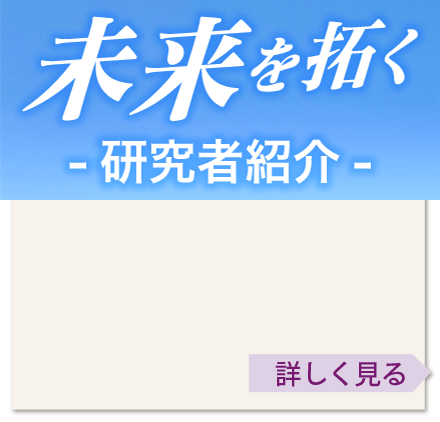 Dr. Rong Shang Assistant Professor, Graduate School of Science, Hiroshima University
Dr. Rong Shang Assistant Professor, Graduate School of Science, Hiroshima University
No.2 Dr. Shang Interview
Dr. Rong Shang, originally from China, has studied and conducted research worldwide including in New Zealand, Australia and Germany. She joined Hiroshima University as an Assistant Professor at Department of Chemistry, Graduate School of Science through Home for Innovative Researchers and Academic Knowledge Users (HIRAKU). In this interview, she shared her research interests, career aspiration, and teaching experience at Hiroshima University.
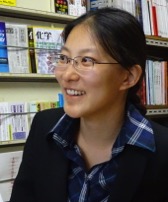
Dr. Rong Shang
Assistant Professor at Department of Chemistry, Graduate School of Science, Hiroshima University
Field of specialization: Organometallic Chemistry
Academic background:
2015 –present: Assistant Professor at Department of Chemistry, Graduate School of Science at Hiroshima University
2011–2015: Post-doctoral research fellow at University of Würzburg in Würzburg, Germany
2008–2011: Ph.D. candidate at The Australian National University in Canberra, Australia
◯ Could you tell us about your research?
My research experience in main group elements and organometallic chemistry lies in the area of discipline that combines organic and inorganic chemistry. I have been actively involved in synthesis, bonding, and reactivity studies of main-group element containing (especially boron) transition metal complexes.
At Hiroshima University, I conduct collaborative research with Professor Yamamoto who specializes in organic chemistry. Currently, we are working on two research projects with our students. One of them evolved from the concept of Frustrated Lewis Pair (FLP) process (see the figure below). It is relatively a new area in chemistry. FLP uses an electron donor with an electron acceptor that cannot directly access each other to form a bond because of the large sizes of the substituents (“steric hindrance” in chemical terms). Instead, they react with a third molecule. When this third molecule is activated, it can be used for a useful transformation. Although this idea was widely developed in main group elements (e.g., phosphorous, nitrogen and boron), in our research, we attempt to explore its application using transition metals as Lewis bases and boron as Lewis acids.
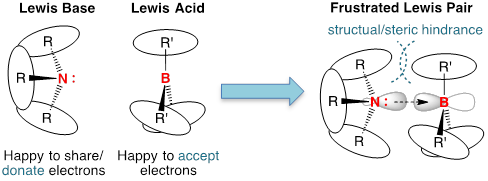
Another project involves designing a new ligand* using transition metals. Transition metals are electronically more flexible and can have different oxidation stages, coordination codes, etc. Because of their properties, they have been widely used as catalysts. Other researchers have investigated a lot of these systems using metals as electron acceptors. In a collaboration with Prof. Yamamoto, we attempt to synthesise novel ligands which offer unique scaffolding to metal centres and explore the chemistry thereafter.
*ligand: an ion or a molecule that stabilises another chemical entity such as a metal ion via bonding.
◯ What are the potential applications of your research?
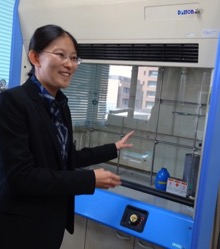 In terms of applicability of our research, there is a potential for use in toxic gas detection, greenhouse gas transformation, activation of organic substrates, and/or catalysis for other useful chemical transformations. Most importantly, if we discover something that hasn’t been discovered as for reactivity or type of bonding, we might open up a new avenue for further research. It is difficult to predict what kind of reactivity certain compounds will have. We expect that they can activate small molecules like the conventional FLPs do but in different ways. We hope to develop applications in useful chemical transformations from any new reactivity discovered from this project.
In terms of applicability of our research, there is a potential for use in toxic gas detection, greenhouse gas transformation, activation of organic substrates, and/or catalysis for other useful chemical transformations. Most importantly, if we discover something that hasn’t been discovered as for reactivity or type of bonding, we might open up a new avenue for further research. It is difficult to predict what kind of reactivity certain compounds will have. We expect that they can activate small molecules like the conventional FLPs do but in different ways. We hope to develop applications in useful chemical transformations from any new reactivity discovered from this project.
◯ What brought you into this research field?
Originally, chemistry didn’t really pique my interest. In fact, I enrolled in Biology and Psychology at the beginning. A scholarship and admission to an accelerated program from the Chemistry Department in my university attracted me into chemistry, which challenged me to think “why” and “how” things were happening in the way they were. It required an understanding of phenomena or reactions through hands-on experiments. I enjoyed this process very much and I thought chemistry would be the perfect subject for me. I decided to study organometallic chemistry during my Honours year (the last year of undergraduate studies) because I was fascinated by various properties of transition metal complexes: diversity in colours, oxidation states, structures and bonding.
◯ How has your teaching experience in Japan been so far?
Although I had trained PhD students as well as undergraduate students at my previous universities, currently, I am undergoing my first “real” teaching experience as a lecturer at Hiroshima University. My class consists of about 20 students and I teach them in English. In addition to the fact that my students are not used to attending lectures in English, their English levels vary. Therefore, pacing my lecture speed is one challenge. For some students, my lecture is too slow. However, it may be too fast for others. In my first lecture, I was stressed out over this. By the end of my second lecture, I realized that I wouldn’t be able to please every one, so I shifted my focus to teaching what I want the students to learn. If my lecture is too fast for some students, I want them to work as hard as they can to catch up.
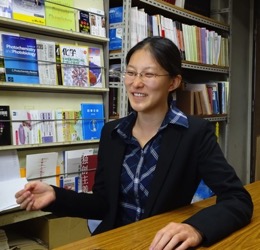 Teaching styles and learning styles are very different between Asia and Western countries. In Asia, students are very busy and they have little time to think for themselves. They study things that they are given to study. In other words, the students take things for granted. They think all the information that they’re given is correct. As a consequence, they accept all the information and won’t attempt to question it. I wish to reverse this. Nonetheless, teachers are very dedicated and students are very studious, which is very nice. In many Western universities, students choose what they want to study. From freshman year, they need to plan their courses and work loads by themselves. If they don’t, they fail.
Teaching styles and learning styles are very different between Asia and Western countries. In Asia, students are very busy and they have little time to think for themselves. They study things that they are given to study. In other words, the students take things for granted. They think all the information that they’re given is correct. As a consequence, they accept all the information and won’t attempt to question it. I wish to reverse this. Nonetheless, teachers are very dedicated and students are very studious, which is very nice. In many Western universities, students choose what they want to study. From freshman year, they need to plan their courses and work loads by themselves. If they don’t, they fail.
I hope I can provide students at Hiroshima University with more opportunities to think critically. In my lecture, I give my students assignments that require them to find and collect information and resources by themselves. They also need to process, reorganise, evaluate the information they found and discuss the contents in written format in English. Although it’s not easy, I believe that educating young generations is as important as conducting research.
◯ Have you faced any obstacles? If so, how did you overcome them?
When I was a PhD student, I faced as many difficulties as every other chemistry Ph.D. student. Experiments often do not work the way they are planned. Everything works on paper, but in reality that is not the case. I was working with reagents that are extremely sensitive (very easy to decompose). I couldn’t isolate my target complexes for a long time. I wasn’t sure if the unsuccessful outcome was because of the chemistry or my experimental techniques. When experiments fail, I have to think of all possible factors, usually starting from how I can improve my techniques and experimental conditions. I was very persistent and optimistic about my project, so I have repeated a lot of reactions so many times. Through logical and systematic change of substrates and decent experimental techniques (refined through multiple repetitions of trial-and-error of course), not only I could synthesise and characterise the target compounds, I also learnt a lot more about why and how they decomposed earlier. I really appreciate this process because it made me think logically. And the results were rewarding.
My long years of experience in living abroad have taught me to work hard and adapt to different circumstances. As an international student, I had more difficulties to overcome than domestic students. When I was 15, I moved to New Zealand with little English. In order to practise English, I tried to avoid using Chinese (my mother tongue) as much as possible. It took persistence to acquire English slowly over the years of my schooling (including later years in universities). However, when I was a post-doctoral researcher in Germany, I couldn’t learn German the same way because I was expected to communicate in English at work (I could not avoid using English as I did with Chinese earlier). However, group meetings were held in German and I somehow had to follow what they said in order to participate in discussions. Now, I am in a similar situation to that in Germany, while I am expected to research and teach in English, I still need to learn Japanese to be able to communicate with students better. With my previous experience, I hope I can adapt to my new work environment slowly. I consider these challenges as a part of the process.
◯ What is your career goal?
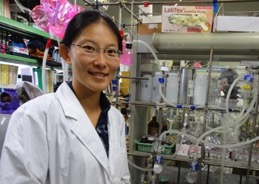 I would like to work as an academic. I think education is important and would like to dedicate my career to educate younger generations. I would be happy to work in Japan if there is an opportunity. I love the vibrant atmosphere in university environments. Although I am shy, I am persistent. If I want to achieve something, I would try very hard to do so. Iam eager to get to know the chemical industries in Japan and wish to conduct collaborative research with them in the future.
I would like to work as an academic. I think education is important and would like to dedicate my career to educate younger generations. I would be happy to work in Japan if there is an opportunity. I love the vibrant atmosphere in university environments. Although I am shy, I am persistent. If I want to achieve something, I would try very hard to do so. Iam eager to get to know the chemical industries in Japan and wish to conduct collaborative research with them in the future.
◯ Message
I am grateful to Hiroshima University for giving me the amazing opportunity to work in Japan. In return, I hope to make a difference and bring out the best of students’ talents.
Thank you Dr. Shang! It was pleasure meeting you.
Author: Rie Usui (Doctoral Student at Graduate School of Integrated Arts and Sciences Hiroshima University)





